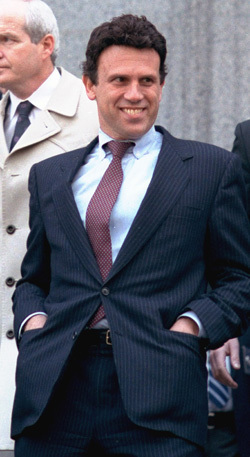
"It began quietly, gained momentum, turned into a torrent, and was soon generating millions--billions--in profit. It was so successful it seemed it couldn't be stopped, regulated, or contained. Investors were lured by its siren song: higher profits with lower risk...The rich prospered and the gulf between them and the poor widened dramatically. Government reaped the growing tax revenues and otherwise did little or nothing...And then it all came to a halt. Experts turned out to be wrong. Once again, investors were reminded that higher returns are always accompanied by higher risk. The soaring values were illusory, simply the manifestation of another of history's economic bubbles..."
James Stewart could have easily been referring to the mortgage crisis that shook our economy, destroyed investor confidence and caused giant financial institutions to crumble in 2008, but he wasn't. This excerpt comes from the author's new introduction to his 1991 tome "Den of Thieves" that chronicles the rise of junk bonds in the 70s and 80s and the ensuing insider trading scandals. Now, one cannot argue with complete fairness that the insider trading scandals of the 80s that implicated dozens of high-powered Wall Streeters and their institutions wouldn't have happened without the rise of junk bonds, but just as we saw in our modern crisis, it's much easier to cheat when there's so much money to cover one's tracks (ahem, Madoff) and much more tempting to do so when so much is at stake (ahem, Goldman Sachs).
 Just as the as the 2000s were filled with investors and institutions who threw their weight behind high-risk mortgage securities, so the 80s were filled with investors clamoring for high-yield bonds. The man who pioneered the junk bond craze (and ultimately lead to the downfall of his firm, his friends and his company) was the one and only Michael Milken-- a charismatic and focused figure that Stewart chronicles in his 600-page, brilliantly reported book. Much like subprime-mortgages, these below-investment-grade bonds proved to be a house of cards that eventually collapsed. We ignored our modern history and were therefore doomed to repeat it.
Just as the as the 2000s were filled with investors and institutions who threw their weight behind high-risk mortgage securities, so the 80s were filled with investors clamoring for high-yield bonds. The man who pioneered the junk bond craze (and ultimately lead to the downfall of his firm, his friends and his company) was the one and only Michael Milken-- a charismatic and focused figure that Stewart chronicles in his 600-page, brilliantly reported book. Much like subprime-mortgages, these below-investment-grade bonds proved to be a house of cards that eventually collapsed. We ignored our modern history and were therefore doomed to repeat it.
What became clear in this book and in our current reality, is that no matter how institutions suffered or how cheats were forced to give back the money they stole, the American taxpayers were the victims of all the financial crimes and all the risky bets.
In both scenarios, there were warning signs: Madoff had too-consistent returns, Dennis Levine (a ring leader in Stewart's book) made uncannily-timed trades. The SEC was reportedly on to both long before any charges were brought. But the regulators were hamstrung. It's hard to prove foul play, especially when the institutions you're up against have unlimited funds and the best minds in the business. The government will never be able to compete monetarily for the best business minds, but it can offer something else: prestige.
One of the heroes of Stewart's book is Rudy Giuliani--a man who took on mob bosses and Wall Street bankers alike. He wanted a career in public office, he wanted to climb the ladder. If we as a country decide our regulators are our most important figures--ones who can protect us against catastrophes like oil leaks in the Gulf and being cheated by ponzi schemers--then we can decide to give them the power they deserve. We can make regulators revered positions like those in the U.S. Attorneys Office. We can give them access to major politicians and clout within their communities. This wouldn't work if these people were just waiting out their regulatory positions until they could be a lobbyist in the private sector, but if we recruit hungry watchdogs who want a life in public sector they can apply the broken window theory to Wall Street--cracking down on the small crimes that lead to the large ones.
It has become abundantly clear that regulation is a major if not the major issue in America. It's no coincidence these crises took effect after deregulatory dynasties--those of Reagan and Bush. What is clear in "Den of Thieves," clear in the Gulf and clear in our economy, is if our regulators aren't as important, educated, and hungry as the people they're regulating, Americans don't have a chance.